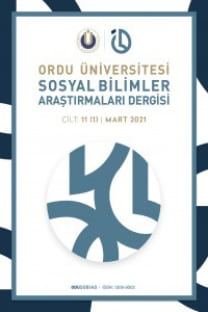Robotik ile Matematik ve Fen Entegrasyonu
Günümüzde bilim ve teknolojide yaşanan hızlı değişimin eğitim alanlarında da etkisini görmek mümkündür. Bu değişime ayak uyduran bireyler yetiştirmek için öncelikle eğitim sisteminde ve öğretme-öğrenme anlayışımızda değişiklikler yapmamız gerekmektedir. Bu doğrultuda hareket eden ülkelerde STEM eğitimi ve kodlama eğitimi hızla popülerlik kazanmıştır. Bu araştırmada fen bilgisi öğretmen adaylarının fen ve matematiği entegre ederek robotik etkinliği hazırlama süreçleri ve bu süreçle ilgili düşüncelerinin incelenmesi amaçlanmıştır. Araştırma, 2020-2021 bahar döneminde üç (3) fen bilgisi öğretmen adayının katılımıyla gerçekleştirilmiştir. Araştırmada, nitel araştırma yöntemlerinden durum çalışması deseni benimsenmiştir. Verilerin toplanmasında araştırmacılar tarafından hazırlanan yarı yapılandırılmış görüşme formu ve gözlem notları kullanılmıştır. Robotik etkinliklerin hazırlanmasında “Robotis Dream II” setinden yararlanılmıştır. Elde edilen veriler içerik analizi yöntemiyle analiz edilmiştir. Sonuç olarak; öğretmen adaylarının etkinlik hazırlama sürecinden sonra, ders kazanımlarına hâkim olma, disiplinlerarası birleştirme yapma ve robot seti kullanımına hâkim olma kazanımlarını elde ettikleri ortaya çıkmıştır. Öğretmen adayları ayrıca fen ve matematikten seçecekleri ve entegre edecekleri kazanımları robota aktarma noktasında endişe yaşamışlar ve robotun montaj aşamasında zorluk yaşadıklarını belirtmişlerdir.
Mathematics and Science Integration with Robotics
Nowadays, the rapid change in science and technology shows its effect in the field of education as in every field. To raise individuals who can keep up with this change, we first need to make changes in the education system and our teaching-learning approach. STEM education and coding education have rapidly gained popularity in countries moving in this direction. In this study, it was aimed to examine the prospective science teachers' processes of preparing the robotics activity by integrating science and mathematics and their thoughts about this process. The research was carried out with the participation of three (3) prospective science teachers in the spring term of 2020-2021. In the research, the case study design, one of the qualitative research methods, was used. A semi-structured interview form prepared by the researchers and observation notes were used to collect the data. "Robotis Dream II" set was used in the preparation of robotics activities. The obtained data were analyzed by content analysis method. As a result, after they prepared the activity, they stated that they were able to master the disciplines’ objectives well, to make connection between the disciplines and to use the robotics education kit. They also stated that they had difficulties to transfer the integrated objectives from science and mathematics disciplines and to assemble the robot.
___
- Akaygun, S., & Aslan Tutak, F. (2016). STEM Images Revealing STEM Conceptions of Pre-Service Chemistry and mathematics teachers. International Journal of Education in Mathematics, Science and Technology, 4(1), 56-71.
- Akgündüz, D., & Akpınar, B. C. (2018). Okul öncesi eğitiminde fen eğitimi temelinde gerçekleştirilen STEM uygulamalarının öğrenci, öğretmen ve veli açısından değerlendirilmesi. Yaşadıkça Eğitim Dergisi, 32(1), 1-26.
- Akgündüz, D., Aydeniz, M., Çakmakçı, G., Çavaş, B., Çorlu, S. M., Öner, T., & Özdemir, S. (2015). STEM Eğitimi Türkiye Raporu "Günün Modası mı Yoksa Gereksinim mi?. İstanbul: İstanbul Aydın Üniversitesi. http://dx.doi.org/10.13140/RG.2.1.1980.0801
- Alan, B. (2017). Fen Bilgisi Öğretmen Adaylarının Bütünleşik Öğretmenlik Bilgilerinin Desteklenmesi: STEM Uygulamalarına Hazırlama Eğitimi (Yöktez No. 488901) [Yüksek Lisans Tezi, Fırat Üniversitesi].
- American Association for the Advancement of Science. (1994). Benchmarks for Science Literacy. Washington DC: Oxford University Press.
- Atman Uslu, N., Mumcu, F., & Eğin, F. (2018). Görsel Programlama Etkinliklerinin Ortaokul Öğrencilerinin Bilgi-İşlemsel Düşünme Becerilerine Etkisi. Ege Eğitim Teknolojileri Dergisi, 2(1), 19-31.
- Atmatzidou, S., Demetriadis, S., & Nika, P. (2018). How Does the Degree of Guidance Support Students’ Metacognitive and Problem Solving Skills in Educational Robotics?. Journal of Science Education and Technology, 27(1), 70-85. https://doi.org/10.1007/s10956-017-9709-x
